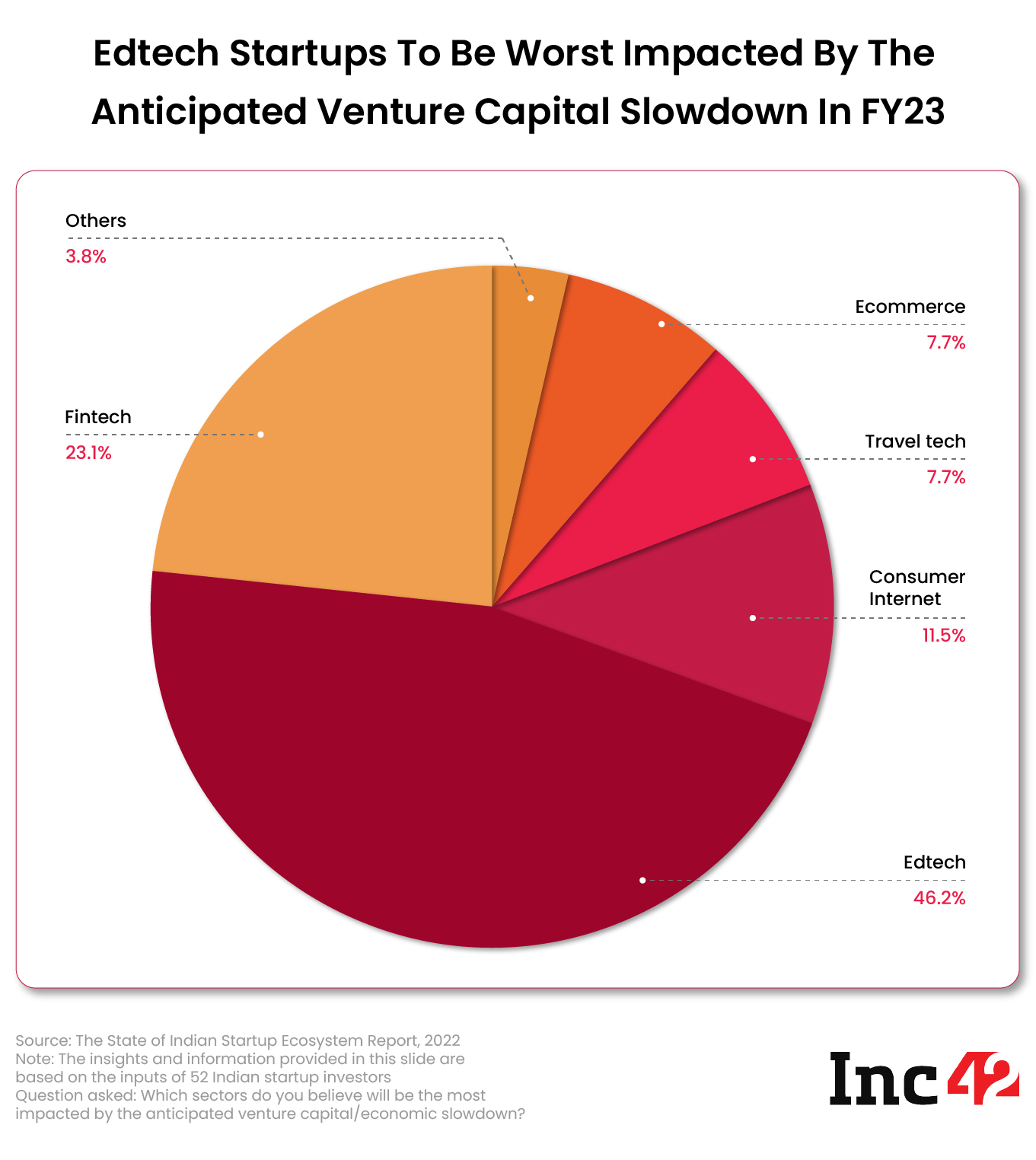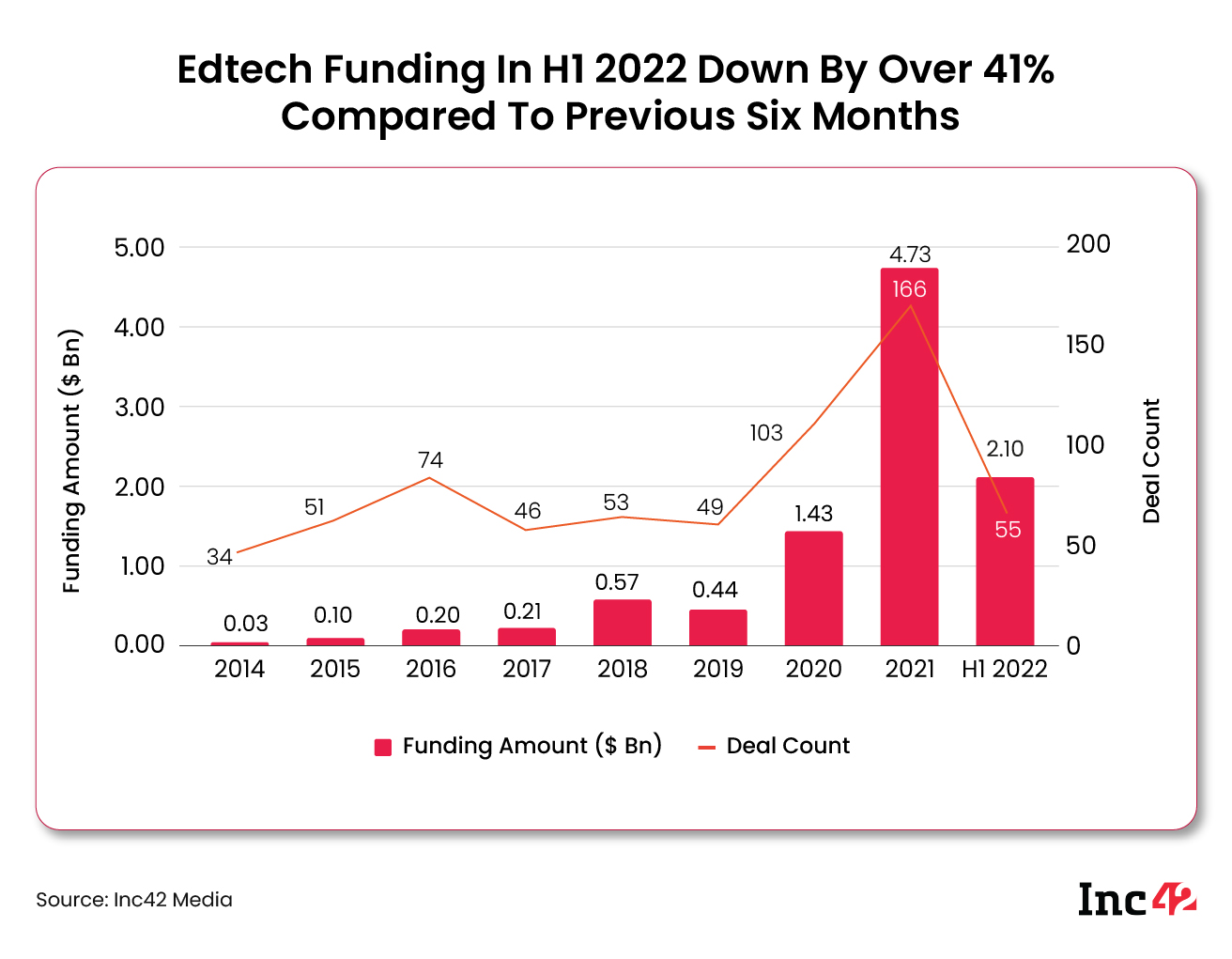In a survey, 46.2% of investors pegged edtech as the sector to be worst impacted by the funding crunch in FY23
Edtech startups raised $2 Bn in funding in H1 2022, which was 38% lower than the $3.4 Bn raised by them in H2 2021
According to Inc42’s ‘Indian Startup Layoff Tracker’, 13 edtech startups have laid off 4,268 employees in 2022 so far
Over the past few months, funding in India’s startup ecosystem has gone down significantly, leaving startups in an unprecedented situation. While the funding crunch has affected startups across sectors, the edtech sector seems to be the worst hit.
According to an investor survey conducted as part of Inc42’s ‘The State of Indian Startup Ecosystem Report, 2022’, edtech is set to be the worst impacted startup segment by the funding slowdown in FY23.

In the survey, almost half of the 52 Indian startup investors said that edtech would be the worst impacted by the funding crunch in FY23.
Declining Revenues And Large-Scale Layoffs
Edtech is one of the largest sectors in the Indian startup ecosystem, having raised $9.8 Bn in funding between 2014 and H1 2022 across 631 deals. There are 396 funded edtech startups in India, including BYJU’S which is valued at $23 Bn.
With schools and educational institutions shut down amidst the Covid-19 pandemic, students flocked to online educational platforms and the edtech startups took off in 2020 and 2021.
However, the pandemic rush is now wearing down. With the reopening of schools and offline coaching centres and daily life returning to normalcy, edtech startups have seen a sharp decline in the number of students using their platforms. The sector is now grappling with declining revenues, and only a few startups have been able to build a brand recall among consumers.
Consequently, investors are now sceptical about investing in edtech startups. As per a recent report, edtech startups raised $2 billion in H1 2022, a decline of 41% from the funding raised in H2 2021.

The funding crunch has also impacted the operations of many of these startups. According to Inc42’s Indian Startup Layoff Tracker, edtech startups have laid off the highest number of employees in 2022 so far. In total, 13 edtech startups in the country have laid off 4,268 employees.
Edtech unicorns Unacademy, Vedantu, WhiteHat Jr and LEAD have together laid off 3,274 employees so far. Besides, two startups from the sector – Udayy and Crejo.Fun – have shut their operations.
Hurdles On The Road Ahead
Going offline: In a bid to adapt, the biggest names in the space are evolving towards a hybrid business model – having both online and offline classes. BYJU’S acquired offline test prep major Aakash Educational Services Limited (AESL) in a billion-dollar deal last year. Others are building their ground presence organically, with Unacademy and PhysicsWallah recently entering the fray with their offline centres.
Talent war with existing offline players: The foray into offline learning centres hasn’t been easy for edtech majors as major offline coaching centres have fiercely competed against the newcomers.
Earlier this year, around 40 top educators from Kota-based Allen Career Institute joined Unacademy, sparking a talent war that saw Allen’s cofounder Brajesh Maheshwari warning teachers against joining newcomers, and Unacademy seeking police protection for the incoming teachers.
Inc42 also exclusively reported that offline education centres were considering approaching the Prime Minister’s Office (PMO) for the alleged violation of competition laws by the edtech startups venturing into the offline space.
Government interventions: The government has already warned edtech players against unfair trade practices. The Centre has also set up a committee to investigate exorbitant claims made by edtech startups relating to the performance of their students and their products and services.
Earlier this year, the University Grants Commission (UGC), the highest body for colleges and universities in India, told higher education institutions to withdraw any degree courses they were offering in partnership with edtech players.
With the funding downturn expected to continue at least for a few more months, it would be interesting to see how the edtech players adapt to the changing tides. While the well-funded startups may get through the ‘funding winter’, there seem to be more troubles ahead for those with lower funding.
Download ‘The State of Indian Startup Ecosystem Report, 2022’






![Read more about the article [Funding alert] Swiggy raises $800M at $5B valuation](https://blog.digitalsevaa.com/wp-content/uploads/2021/04/shutterstock1730607304-1594028762169-300x150.png)


